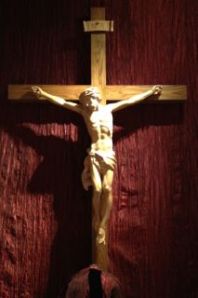At the Benediction: Chorale Prelude on O Lamm Gottes unschuldig – Johann Pachelbel (1653-1706)
Closing Voluntary: Chorale – O Lamm Gottes unschuldig – Johann Pachelbel (1653-1706)
The incidental music for tonight’s liturgy of Benediction of the Blessed Sacrament is based on the German Chorale O Lamm Gottes unschuldig. Both text and tune are the work of Nikolaus Decius (1485-1541). Decius was born in Upper Franconia Bavaria and studied at the University of Leipzig and obtained a master’s degree at Wittenberg University. He became a monk and, by 1519, Probst of the cloister at Steterburg near Wolfenbüttel. Influenced by the ideas of Martin Luther (1483-1546), he left the cloister in 1522 and went to Brunswick where he was appointed a master in the St. Katherine and Egidien school. In 1523 he was invited to Stettin by the burgesses there to become an evangelical preacher. He was recognized as the pastor of St. Nicholas church in 1535 and died there suddenly in 1541 of suspected poisoning. Shortly before his death, he wrote the hymn O Lamm Gottes unschuldig, a hymn expanding and paraphrasing the Angus Dei of the Latin mass and adapting an earlier tune from the 13th century. It was first published in the Christliche Kirchen-Ordnung in 1542.
O Lamb of God most holy!
Who on the cross did suffer,
And patient, still and lowly,
Yourself to scorn did offer;
Our sins by You were taken,
Or hope had us forsaken.
Your peace be with us, Jesus.
The organ setting played this evening is the work of south German organist, Johann Pachelbel (1653-1706). Pachelbel was born in Nuremburg into a middle class family as the son of a wine dealer. He began his music studies at an early age and by 1673 was living in Vienna where he was deputy organist there at the famous Saint Stephen’s Cathedral. After spending one year in Eisenach in 1677, he moved to Erfurt where he remained for 12 years. It was during this time that he began composing many of the Chorale Preludes for organ that were to be his most notable contributions to south German music and which comprised fully half of his works for organ. After brief employ in Stuttgart and Gotha, Pachelbel returned to his native Nuremburg where his fame was such that he was hired without audition and without the position being offered out to other possible candidates. He died there in 1706 at the age of only 52 years.

